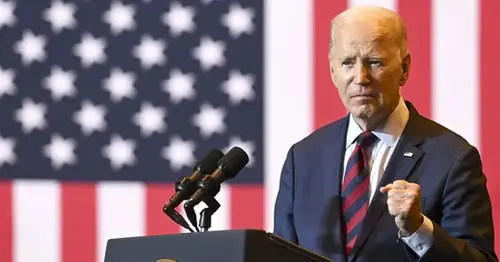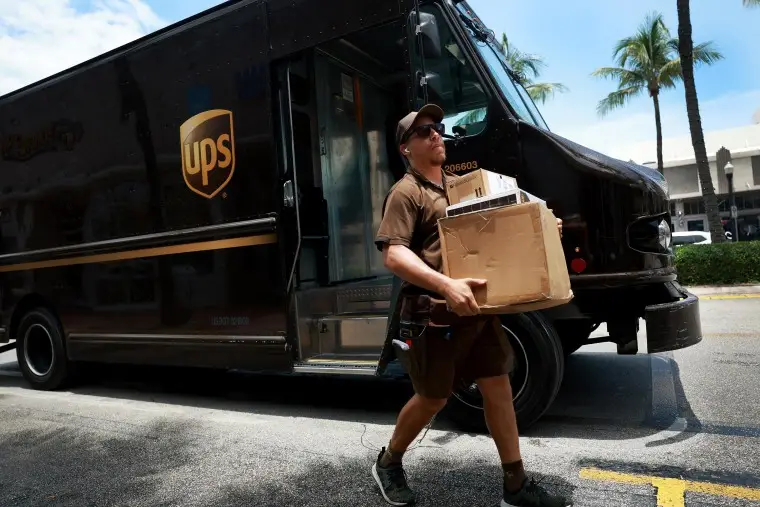
How Biden plans to handle a series of possible labor strikes across the country
PHILADELPHIA — The White House is navigating several labor disputes that could undermine key factors in President Joe Biden’s re-election campaign, most notably an increasingly strong economy and his political support from unions.
Hollywood is already on strike. UPS workers may go on strike at month’s end. And another sector close to Biden’s heart — the auto industry — could strike in the coming months if workers aren’t able to agree to new contracts with the Big Three automakers.
Biden isn’t inserting himself directly in any of the negotiations, officials said, even though he met Wednesday with the president of the United Auto Workers at the White House. Instead, the officials said, Biden has tasked different administration officials with monitoring the talks. Senior adviser Gene Sperling, for instance, is taking the lead on the autoworkers.
Biden’s labor allies are getting nervous that his administration may seek to intervene in a way that could undercut their negotiating position. The Teamsters — representing UPS workers — recently publicly urged him to stay out of its talks at a critical phase.

White House officials say the administration’s position on not intervening won’t change, even though mounting work stoppages threaten to disrupt people’s lives and complicate the economic case he wants to make to voters.
“It’s obviously best for the economy if we can have those kinds of mutually beneficial agreements before there’s a strike deadline,” Celeste Drake, the deputy director of the National Economic Council focused on labor issues, said in an interview before Biden spoke to a union-heavy audience here Thursday. “But frankly, the president has repeated over and over and over he supports the right to strike.”
Biden’s strategy toward the labor disputes is a stark shift from how the White House handled a potentially crippling rail strike last year. In that instance, administration officials directly mediated and ultimately imposed a brokered agreement between freight carriers and a coalition of unions after several members of the coalition voted not to ratify it. That was a unique case, White House officials say, because negotiations were happening under the terms of the Railway Labor Act, which required the administration to be involved.
Drake, who previously was a trade specialist for the AFL-CIO, argued that workers "feel empowered to organize and to bargain hard.” And White House officials are downplaying any potential for the disputes to undermine Biden’s newly ramped-up efforts to politically capitalize on lowering inflation and a robust job market as he runs for re-election.
That having been said, strikes are, by their very nature, intended to disrupt the economy, officials acknowledge.
The Teamsters and UPS will resume negotiations sometime next week, facing a July 31 deadline to reach a deal. If no agreement is reached, it could trigger the largest work stoppage at a single employer in U.S. history. White House officials who had said just weeks ago they were confident a deal would be reached now are less sure.
“We’ve told the White House, we’ve taken a strong position — my neighborhood where I grew up in in Boston, if two people had a disagreement and you had nothing to do with it, you just kept walking. And we echoed that to the White House on numerous occasions,” Teamsters President Sean O’Brien told wary members in a webinar this week. “The White House shouldn’t be concerned with the Teamsters; they should be concerned about corporate America. … We’re not going to let anybody else implement a contract.”
In a sign that a contract deal between the Teamsters and UPS could be reached before the deadline, UPS said Thursday in a statement, “We are prepared to increase our industry-leading pay and benefits.”
A resolution to one of the labor disputes would be welcome news for the White House, which another White House official described as having “different levels of engagement in each case.” On Wednesday, when UAW leaders went to the West Wing to brief senior staff members on the state of negotiations, Biden asked to speak with UAW President Shawn Fain directly for an update, in what the White House describes as a “short” meeting.
The UAW didn’t respond to requests for comment.
Separately, acting Labor Secretary Julie Su played an active role recently in helping see through a tentative deal between West Coast dock workers and port operators.
Also this week, White House chief of staff Jeff Zients and deputy chief of staff Natalie Quillian and National Economic Council Director Lael Brainard went to the AFL-CIO’s headquarters near the White House to discuss “core labor issues” with its and other unions’ leaders, including how to ensure the administration is implementing key economic legislation to prioritize union labor.
“The role of the federal government as a whole is not to get involved in every negotiation,” Drake said, adding that there are ways “we can help.”
“We are available to do that when welcomed by both sides,” she said.
Major labor unions, many of which have endorsed Biden’s re-election, feel the political tide had turned in their favor, especially after the Covid pandemic, which placed new focus on working conditions and economic mobility. It isn’t just traditional unions pushing the envelope, as previously nonunionized workers are looking to do.
On Thursday, Biden once again touted his union bona fides. Speaking to an audience in a Philadelphia shipyard hangar with hard-hatted workers watching from the rafters, he ticked off how different unions across different states will be manufacturing the component parts of a new naval vessel being commissioned here to build offshore wind farms.






